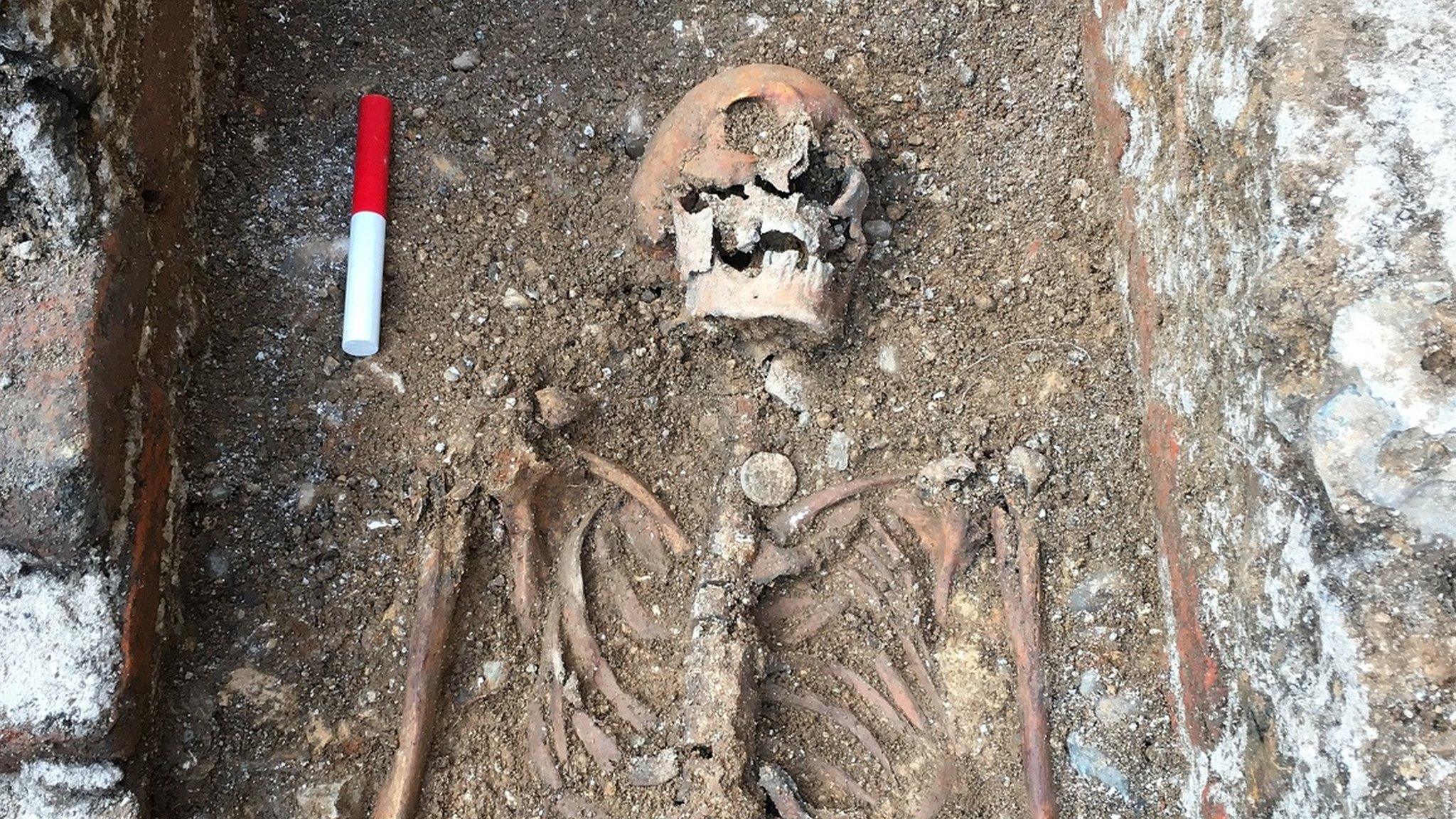I'm still learning about the cathedral, says guide
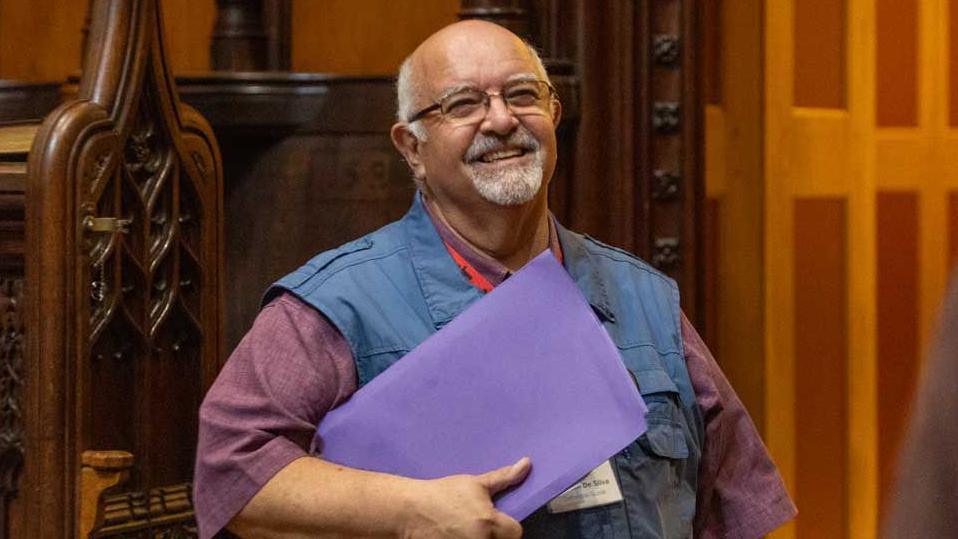
With 45 years of service, Stephen de Silva is St Albans Cathedral's longest serving active guide
- Published
As St Albans Cathedral's longest serving active guide, who is spending his 46th Christmas in the role, Stephen de Silva talks of the importance of telling its history and how he is still learning about the church.
The cathedral, a shrine to Britain's first saint, is the oldest site of continuous Christian worship in Britain.
After moving to St Albans in 1979, Mr de Silva found the Norman cathedral was "a nice place to go to church" but his experience and communication skills as a drama and religious education teacher were soon noticed and he was told he "would make a wonderful guide".
In those days, there were a handful of people who "occasionally did a tour if somebody asked", he said.
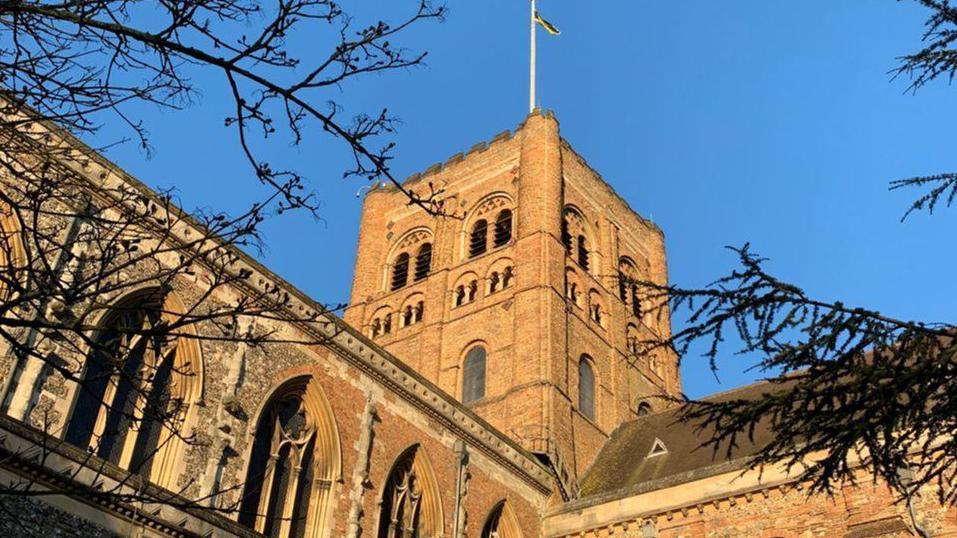
The cathedral, a shrine to Britain's first saint, is the oldest site of continuous Christian worship in Britain
"You went round with the head guide twice and then you were a guide.
"Today we make [trainee guides] jump through hoops, quite rightly because they're representing the cathedral to large numbers of people."
He said that as well as explaining the history of the building, their "core purpose is to talk about the importance of the Christian faith and what that means to people and how it's guided them through the ages".
He learned on the job but said even he is "still learning".
"It will usually come about when a member of the public says 'what's that?'," and you go 'Oh what IS that?," he said.
"It's usually a little detail in a window, or a carving… and, of course, research changes as well."
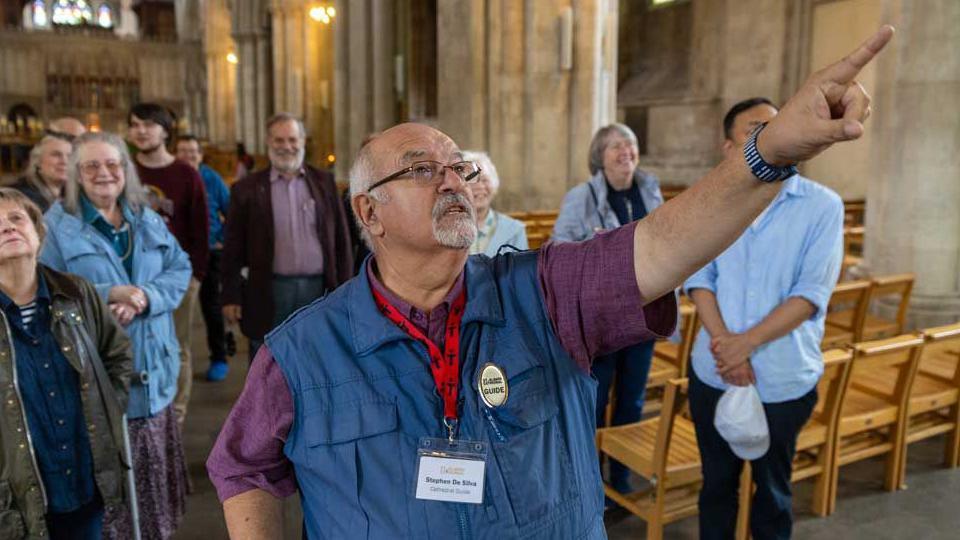
Mr de Silva said he has noticed a change in the demographic of visitors over the years
For example, he explained, 45 years ago the date of the death of Alban was thought to be 209 AD, which was based on a manuscript that had since been proved to be wrong. Now the date is about the year 300 and has been confirmed by archaeology.
"Archaeology is always changing the way we think about things," he said.
"I love that kind of historical puzzle, somebody will write a learned paper and you'll go 'gosh I'd not really looked at it that way'."
He added that he likes to tell stories about people because others "relate to them" and the story of the cathedral is not just about the building, but about the people who have engaged with it.
People such as Thomas de la Mare, who bought his memorial brass in 1349 - which the Abbey still has - after being taken ill in Europe and believing he was going to die, he said.
"Then he lived another 50 years," he said, "the face on the brass is of a 30-something but he was 89 when he died.
"I like telling that story because people laugh."
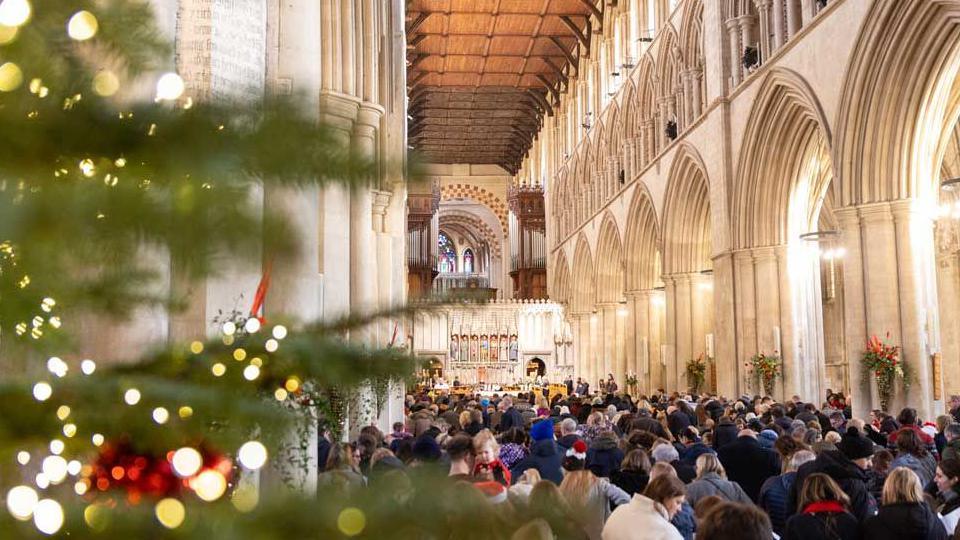
Mr de Silva said the build up to Christmas at the cathedral is a "lovely time" and they try to be as seasonal as they can in their tours
He said he has noticed a change in visitors over the years, especially after the cathedral's Alban project, external, an initiative which started 10 years ago to raise the profile of the church.
"One of the aims was to increase numbers and to widen our audience and those two things have happened now," he said.
"Twenty or 30 years ago we maybe got those who would visit all the stately homes and cathedrals until they came out of their ears, but I think we do get a broader range of visitors now who are more generally interested and I like that.
"I love showing it to foreign visitors because they are usually hugely impressed by it, but the big challenge with them is lots of them don't have a background in English history so you can't take things for granted.
"I often end up having to explain the Norman invasion or the Reformation. But I like a challenge."
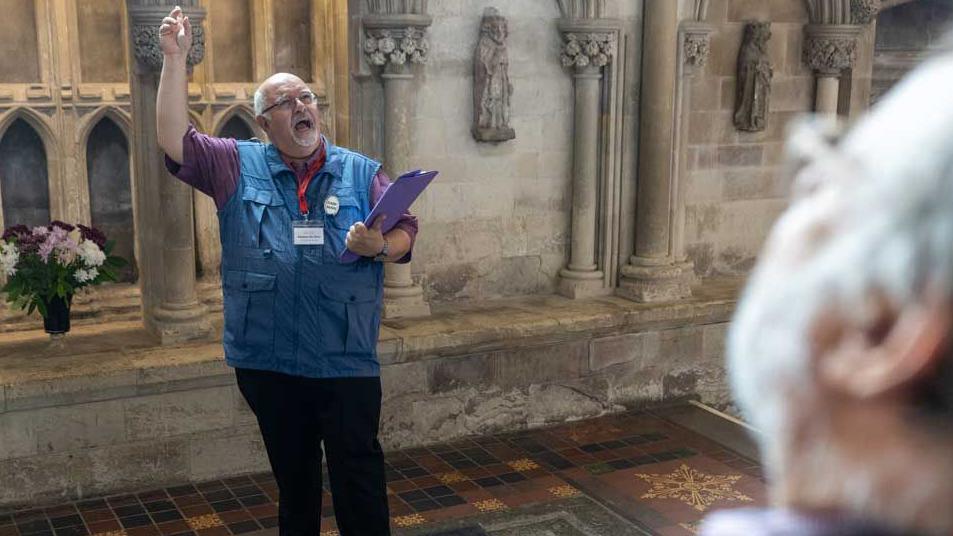
The story of the cathedral is not just about the building, but about the people who have engaged with it, the guide said
In the past 45 years, Mr de Silva has been a warden and lay canon, has helped to shape the visitor experience and was awarded an MBE for his contributions to heritage and community. More recently he has written An Illustrated Timeline, a fold out guide to the building across the centuries. He also now trains new guides.
There are now about 60 guides and the cathedral offers three tours a day, plus more specialised ones according to need.
Trainees spend six months on a training course before an assessment.
"I think our training programme is quite well recognised by lots of other cathedrals, I think we were one of the first to put something like this in place," he said.
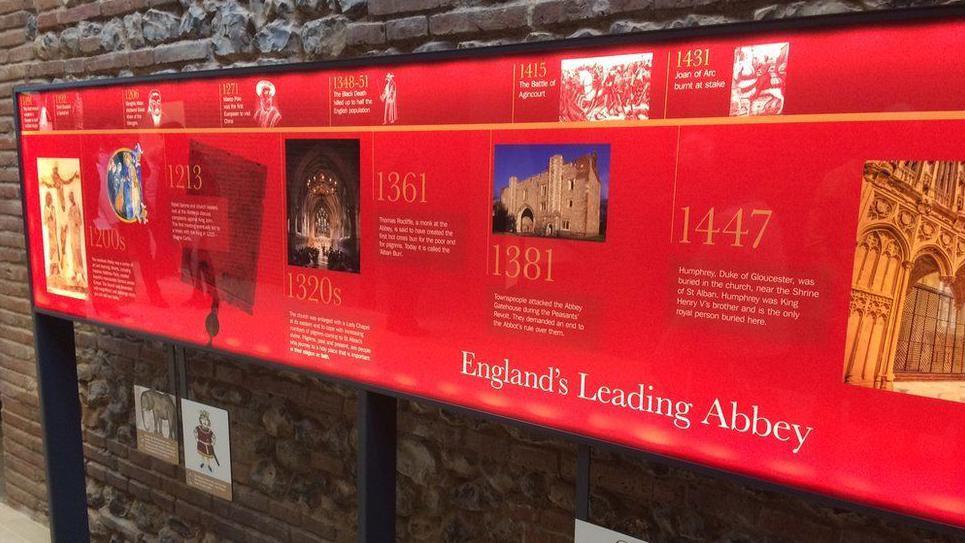
Mr de Silva has used the timeline in the visitor centre as a basis for a fold-out guide to the cathedral's history
The Very Revd Jo Kelly Moore, the Dean of St Albans, said the guides "in their extraordinary knowledge of the history of this holy place continue to bring amazement and a wealth of information to all who come here".
Alan Hartwell, the cathedral's chief operations officer, said: "By blending storytelling with education, our guided tours enhance visitor engagement and help ensure that our cathedral continues to be a beacon of history and inspiration for generations to come."
Get in touch
Do you have a story suggestion for Beds, Herts & Bucks?
Follow Beds, Herts and Bucks news on BBC Sounds, Facebook, external, Instagram, external and X, external.
Related topics
More about this story
- Published17 December 2024
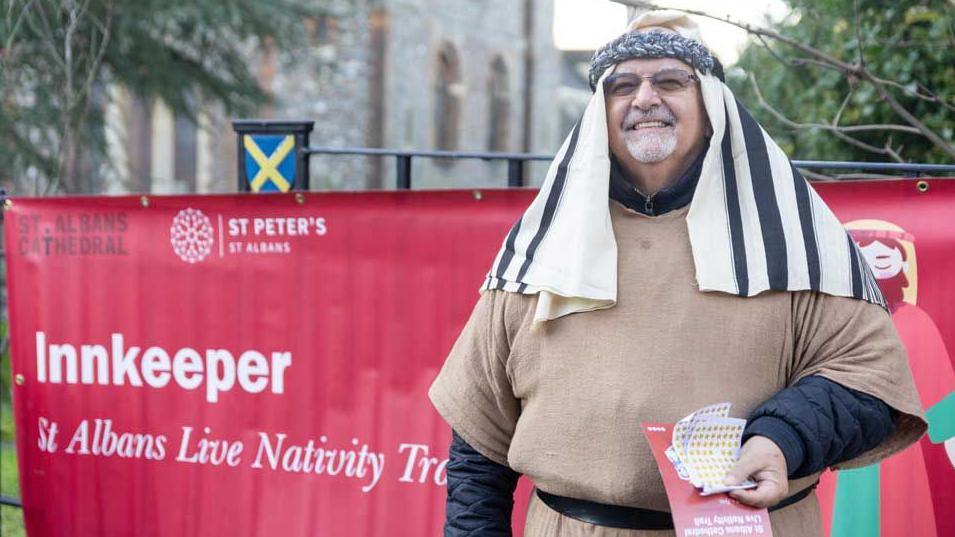
- Published4 August 2022
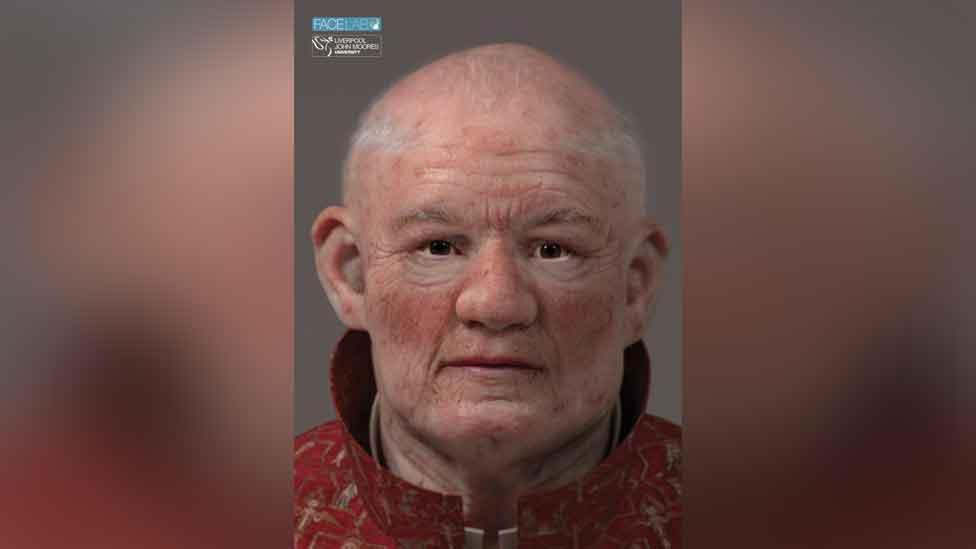
- Published7 December 2017
